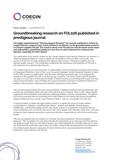Groundbreaking research on FOL026 published in prestigious journal
The highly regarded journal "Pharmacological Research" has recently published an article by Coegin Pharma's research team, led by Professor Jan Nilsson, on the groundbreaking research on Coegin's peptide FOL026. The research shows how FOL026 can activate blood vessel repair and regeneration, potentially leading to a new first-in-class treatment for cardiovascular diseases, especially for heart attacks.
The publication of the article, written by the Coegin research team led by Professor Jan Nilsson, in "Pharmacological Research" marks a significant recognition in the scientific community. The journal is known for its high standards and rigorous peer review, choosing to publish only the highest quality research. This publication underlines the importance and potential of FOL026 in the treatment of cardiovascular diseases.
The research group at Lund University, in collaboration with the Shanghai Cardiovascular Institute of Integrative Medicine, is part of the Lund University Diabetes Centre-Industrial Research Centre (LUDC-IRC) research collaboration, and has been working for several years to investigate the potential of the peptide FOL026 in cardiovascular medicine. The study shows that this peptide can play a crucial role in improving the health of blood vessels by promoting both repair and new blood vessel formation. These findings have great potential to transform treatment methods for patients suffering from cardiovascular diseases, particularly heart attacks.
"We are witnessing exciting advances and innovations in diabetes treatment and management, with several new medications approved only in the past few years. However, there is still a need to better understand the mechanisms and pathways underlying diabetic vascular complications. The effects of FOL026 presented here are promising and I look forward to the results form future translational studies testing this new concept," says Professor Maria F. Gomez, coordinator of LUDC-IRC.
A reduced ability to repair damaged blood vessels is a significant cause of organ-related complications in diabetes, including heart attacks, strokes, and diabetic kidney disease. Additionally, a diminished ability to form new blood vessels is considered a key factor behind several sideases such as chronic foot ulcers that many people with diabetes suffer from, and also ischaemic heart disease caused by myocardial infarction, responsible for 16% of the world's total deaths.
"We are very pleased that our research on FOL026 has been published in 'Pharmacological Research.' This recognition not only demonstrates the importance of our discovery that FOL026 has the ability to repair and form new blood vessels, but it also highlights the scientific value of our work. We hope that this publication opens doors for further research and development of new treatments for cardiovascular diseases, especially for heart attacks where I see great potential for better treatments," says Professor Jan Nilsson.
The next step in the project is to study how the peptide can protect heart tissue during an acute heart attack, thereby reducing the risk of heart failure. The research team plans to conduct further preclinical studies to verify these results and investigate potential clinical applications of FOL026. The aim is to conduct the first clinical studies within two to three years.
Reference to the article: Chen Y, Gialeli C, Shen J, Dunér P, Walse B, Duelli A, Caing-Carlsson R, Blom AM, Zibert JR, Nilsson AH, Alenfall J, Liang C, Nilsson J. Identification of an osteopontin-derived peptide that binds neuropilin-1 and activates vascular repair responses and angiogenesis. Pharmacol Res. 2024 Jul;205:107259. doi: 10.1016/j.phrs.2024.107259. Epub 2024 Jun 11. PMID: 38871237. https://www.sciencedirect.com/science/article/pii/S1043661824002044
For further information, please contact:
Jens Eriksson, CEO
Email: [email protected]
Phone: +46 72 221 24 21
This document is a translation of the original Swedish press release. In case of any discrepancies, the Swedish version shall prevail.
About Coegin Pharma
Coegin Pharma is a Swedish biotechnology company with several innovative groundbreaking drug candidates and dermocosmetic products. The company's projects have great potential for treating patients with serious diseases such as cancer and heart attack, as well as improving the quality of life for people in need of cosmetic products for hair growth. The strategy is to create value by developing and commercializing dermocosmetic products in partnership with leading commercial players and by early out-licensing "first-in-class" drug candidates to major pharmaceutical companies.
For more information: www.coeginpharma.com/en
About LUDC-IRC
Lund University Diabetes Centre-Industrial Research Centre is a collaborative research center that, through interdisciplinary research, works to find solutions to the major scientific challenges in diabetes and diabetes-associated diseases. LUDC-IRC is a research collaboration involving 350 key people from academia and industry and is supported by the Swedish Foundation for Strategic Research. Partners in this collaboration: Region Skåne, Lund University Diabetes Centre, Coegin Pharma AB, Pfizer Inc, Johnson & Johnson Innovation, Novo Nordisk A/S, Probi AB and Abcentra.
For more information: www.ludc.lu.se/ludc-irc
Filer

Filer
Om Coegin Pharma
Coegin Pharma är ett svenskt bioteknikföretag som utvecklar banbrytande innovationer för hår och hud.
Prenumerera
Få löpande information från Coegin Pharma via e-post.
